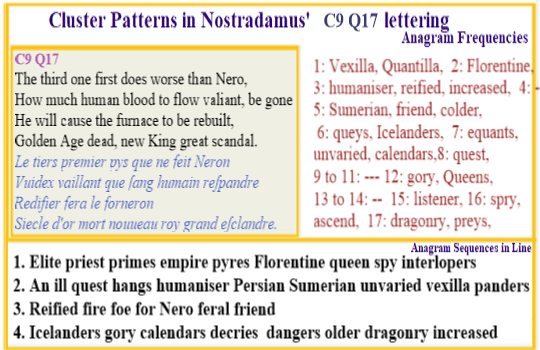 Analyses of all verses
Analyses of all verses
|
 Web Site
Web Site |
 All
Sefirots All
Sefirots |
Nostradamus C9 Q17: Medici Florentine Queen of France.
Copyright: Allan Webber, December 2015
 It would be surprising if either the Medici line or the reign
of Henry IV of France were absent from Nostradamus' Prophecies but this is not
the case.
It would be surprising if either the Medici line or the reign
of Henry IV of France were absent from Nostradamus' Prophecies but this is not
the case.
In fact his entrie do cover his own era but these episodes also perform prominent roles in laying down threads about the secondary issues covering events that are part of the great mutations of the 21st century.
Such a theme can be found in the text of the current verse with its references to the third (of the 16th century series of kings called Henry). His text mentions the third being worse than Nero.
Both Nero and Heny III of France influenced a period where human blood flowed freely and burnings were frequent which is also seable in the current verse.. This French king was succeeded by the more successful reign of Henry IV, after another of the constant religious wars that vexed the 16th century.
It was under this new kings reign that a period known as a Golden Age came to France. Maria de Medici, a Florentine princess became his wife in 1600 and the day before his death in 1610 she was crowned Queen of France.
Althougn Henry's infidelities created considerable scandal there were many other causes of gossip and slander about his wife.
The following are extracts from the Wikipedia entry on Maria de Medici, Queen of France.
Maria Medici married Henri IV by proxy in 1600 and the wedding was a festive occasion in the city with a spectacular ceremony in the Cathedral. In spite of her husband's infidelity, the marriage was blessed with several children and Maria showed herself useful in affairs of state while encouraging cultural life at court. On the death of her husband, she acted as regent, though by the time Louis XIII came of age, she had allied herself with Spain and against her son. Cardinal Richelieu turned the tables and Louis XIII regained his throne, banishing his mother from court.
...The marriage was successful in producing children, but it was not a happy one. The queen feuded with Henry's mistresses in language that shocked French courtiers. She quarrelled mostly with her husband's leading mistress, Catherine Henriette de Balzac d'Entragues, whom he had promised he would marry following the death of his former "official mistress", Gabrielle d'Estrees. When he failed to do so, and instead married Marie, the result was constant bickering and political intrigues behind the scenes. Although the king could have easily banished his mistress, supporting his queen, he never did so. She, in turn, showed great sympathy and support to her husband's banished ex-wife Margaret of Valois , prompting Henry to allow her back into the realm.
Some of the detail of this story such as Florentine Queen is contained within the anagrams but their inclusion is there to provide identifying keys linking this and another theme, the building of calendars using ancient poetic-chant coding methods.
Key Ideas:
Florentine, queen, unharming, Persian-Man, androgynes, interlopers, increased, vexilla, quantilla, Sumerian, Icelanders, gory, quest, Calendars, unvaried, humaniser, reified, reptiles, friend, decries colder, listener, hung,town, empires,